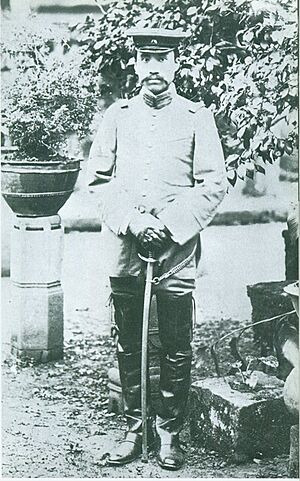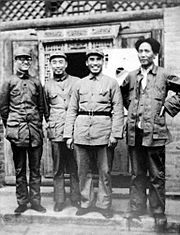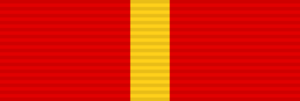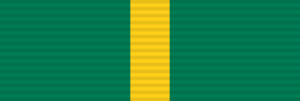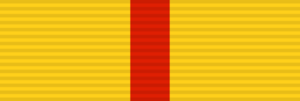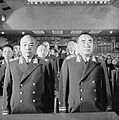Zhu De facts for kids
Quick facts for kids
Yuanshuai
Zhu De
|
|||||||||||
|---|---|---|---|---|---|---|---|---|---|---|---|
|
朱德
|
|||||||||||
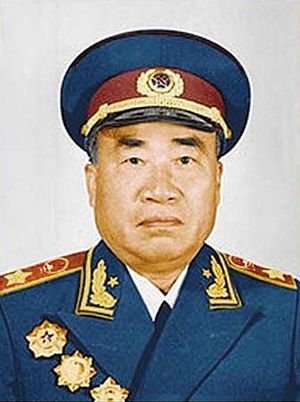
Marshal Zhu De in 1955
|
|||||||||||
| 2nd Chairman of the Standing Committee of the National People's Congress | |||||||||||
| In office 28 April 1959 – 6 July 1976 |
|||||||||||
| President | Liu Shaoqi None (Post abolished in 1975) |
||||||||||
| Preceded by | Liu Shaoqi | ||||||||||
| Succeeded by | Soong Ching-ling (acting) | ||||||||||
| Head of State of the People's Republic of China as Chairman of the NPCSC |
|||||||||||
| In office 17 January 1975 – 6 July 1976 |
|||||||||||
| Premier | Zhou Enlai Hua Guofeng |
||||||||||
| Leader | Mao Zedong | ||||||||||
| Preceded by | Dong Biwu (as acting chairman of the PRC) | ||||||||||
| Succeeded by | Soong Ching-ling (acting) | ||||||||||
| 1st Vice Chairman of the People's Republic of China | |||||||||||
| In office 27 September 1954 – 27 April 1959 |
|||||||||||
| Chairman | Mao Zedong | ||||||||||
| Succeeded by | Soong Ching-ling and Dong Biwu | ||||||||||
| Vice Chairman of the Chinese Communist Party | |||||||||||
| In office 28 September 1956 – 1 August 1966 |
|||||||||||
| Chairman | Mao Zedong | ||||||||||
| Secretary of the Central Commission for Discipline Inspection | |||||||||||
| In office 9 November 1949 – 31 March 1955 |
|||||||||||
| Preceded by | Li Weihan | ||||||||||
| Succeeded by | Dong Biwu | ||||||||||
| Commander-in-Chief of the People's Liberation Army | |||||||||||
| In office 28 November 1946 – 27 September 1954 |
|||||||||||
| Preceded by | Post established | ||||||||||
| Succeeded by | Post abolished | ||||||||||
| Personal details | |||||||||||
| Born | 1 December 1886 Yilong County, Sichuan, Qing Empire |
||||||||||
| Died | 6 July 1976 (aged 89) Beijing, People's Republic of China |
||||||||||
| Political party | Chinese Communist Party (1925–1976) | ||||||||||
| Spouses |
Xiao Jufang
(m. 1912; death 1916)Chen Yuzhen
(m. 1916; death 1935)Wu Ruolan
(m. 1928; death 1929)Kang Keqing
(m. 1929) |
||||||||||
| Children | Zhu Qi Zhu Min |
||||||||||
| Alma mater | Yunnan Military Academy | ||||||||||
| Nicknames | 朱老总 (Zhū lǎozǒng, "Old Chief Zhu") | ||||||||||
| Military service | |||||||||||
| Allegiance | |||||||||||
| Branch/service | |||||||||||
| Years of service | 1927–1976 | ||||||||||
| Rank |
|
||||||||||
| Battles/wars |
|
||||||||||
| Awards |
|
||||||||||
| Chinese name | |||||||||||
| Chinese | 朱德 | ||||||||||
|
|||||||||||
| Courtesy name: Yujie | |||||||||||
| Simplified Chinese | 朱玉阶 | ||||||||||
| Traditional Chinese | 朱玉階 | ||||||||||
|
|||||||||||
Zhu De (朱德; 1 December 1886 – 6 July 1976) was an important Chinese leader. He was a general, a military planner, and a politician. He played a big role in the Chinese Communist Party.
Zhu De was born poor in Sichuan in 1886. When he was nine, a rich uncle adopted him. This helped him get a good education and go to a military school. After school, he joined a rebel army. Later, he became a strong supporter of communism.
He joined the Chinese Communist Party and rose through the ranks. He helped lead the Chinese Red Army during the Chinese Civil War. Zhu De was a key founder of the People's Republic of China. In 1955, he became one of the ten founding marshals. He remained an important political figure until he passed away in 1976.
Contents
Zhu De's Life Story
Early Years and Education
Zhu De was born on December 1, 1886. His family were poor farmers in a hilly part of Sichuan province. Only eight of their fifteen children survived. Even though his family was poor, they worked together. They made sure Zhu De could go to a local private school in 1892.
When he was nine, his wealthy uncle adopted him. This helped him get into the Yunnan Military Academy. He went to a high school in Sichuan around 1907. He finished school in 1908. After that, he worked as a gym teacher at a primary school. He believed in modern science and new ways of teaching. Because of his ideas, he was fired from his job. Then, he joined the Yunnan Military Academy in Kunming. There, he joined a secret political group called the Tongmenghui. This group later became the Kuomintang.
Becoming a Communist
After graduating, Zhu De taught at the Yunnan Military Academy. He joined the revolutionary forces in 1911. He helped fight against the old Qing dynasty. He became a commander in the army. After a leader named Yuan Shikai died in 1916, Zhu De became a brigade commander.
His soldiers supported him, and he became a powerful military leader. In 1920, he left China to study in Europe. In 1922, he tried to join the Chinese Communist Party. But they said no because he was a military leader.
In late 1922, Zhu De went to Berlin, Germany. He studied at Göttingen University. There, he met Zhou Enlai. He was kicked out of Germany for taking part in student protests. Around this time, he finally joined the Chinese Communist Party. Zhou Enlai helped him become a member. In 1925, he went to the Soviet Union. He studied military topics and Marxism there.
Working with Mao Zedong
In 1927, Zhu De's army joined forces with Mao Zedong's group. This happened in the Jinggang Mountains in 1928. Zhu De helped build up the Red Army. He also helped expand the areas controlled by the Communists.
Zhu De and Mao Zedong worked so closely together that people called them "Zhu-Mao." In 1929, they had to leave Jinggangshan. They moved to Ruijin and formed the Jiangxi Soviet. This area grew to include about three million people. In 1931, Zhu De became the leader of the Red Army in Ruijin.
He led the army in battles against the Kuomintang. In 1934, Zhu De helped start the Long March. This was a long and difficult journey for the Communist forces.
Leading the Red Army
During the Long March, Zhu De worked with Zhou Enlai. He supported Mao Zedong's ideas at the Zunyi Conference. After this meeting, Zhu De worked closely with Mao and Zhou on military plans.
Zhu De helped rebuild the Red Army. He followed Mao's political guidance. During the Second Sino-Japanese War, he was the Commander-in-Chief of the Red Army. In 1940, he helped plan a big attack called the Hundred Regiments Offensive. This was a successful campaign.
Later Life and Legacy
In 1949, Zhu De became the Commander-in-Chief of the People's Liberation Army (PLA). He also served as the vice-chairman of the Communist Party. From 1954 to 1959, he was the vice-chairman of the People's Republic of China. He oversaw the PLA during the Korean War.
In 1955, he was given the rank of marshal. Zhu De remained an important figure. He continued to work as a statesman until he died on July 6, 1976. His death came shortly after Zhou Enlai's and just before Mao Zedong's.
Family Life
Marriages
Zhu De was married four times.
- Xiao Jufang: They married in 1912. She died in 1916 after giving birth to their son, Baozhu.
- Chen Yuzhen: They married in 1916. She was killed by the Kuomintang in 1935.
- He Zhihua: She met Zhu De in Shanghai. They went to Germany together. She gave birth to their daughter, Zhu Min, in Moscow.
- Wu Ruolan: They married in 1928. She was captured and executed in 1929.
- Kang Keqing: Zhu De married Kang in 1929. She was a member of the Red Army. She fought alongside her husband as a soldier. Kang Keqing lived longer than Zhu De.
Children
- Zhu Baozhu (later named Zhu Qi) was born in 1916. He passed away in 1974.
- Zhu Min was born in Moscow in 1926. Her mother was He Zhihua. She studied in Moscow and later taught at Beijing Normal University. She passed away in 2009.
Awards and Honors
- Red Star Medal (1st Class) (1933)
Images for kids
-
Zhu De and Peng Dehuai (left) at the Marshal of the People's Republic of China rank awarding ceremony.
See also
 In Spanish: Zhu De para niños
In Spanish: Zhu De para niños
- Chinese Red Army
- Eighth Route Army
- History of the People's Republic of China (1949–1976)
- List of generals of the People's Republic of China
- People's Liberation Army
 | Emma Amos |
 | Edward Mitchell Bannister |
 | Larry D. Alexander |
 | Ernie Barnes |


